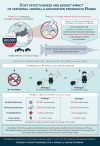Cost effectiveness and budget impact of universal varicella vaccination in Russia
- PMID: 35258445
- PMCID: PMC9196720
- DOI: 10.1080/21645515.2022.2045152
Cost effectiveness and budget impact of universal varicella vaccination in Russia
Abstract
This economic evaluation assesses the cost-effectiveness and budget impact of introducing a two-dose varicella vaccine in the Russian national immunization program. A static Markov model followed a simulated 2019 Russian cohort over its lifetime and compared outcomes and costs of three varicella vaccination strategies: strategy I (doses given at 12 and 15 months of age), strategy II (doses given at 1 year and 6 years of age), and a no vaccination scenario. Inputs on age-dependent clinical pathways, associated costs, and related health outcomes were collected from national sources and published literature. Results are presented as incremental cost-effectiveness ratio (ICER) from the healthcare payer and societal perspective over the lifetime of the birth cohort and the budget impact over a 10 years' time horizon. Vaccination strategies I and II resulted in an ICER of approximately 1.7 million rubles per quality-adjusted life years gained from the healthcare payer perspective and were cost-saving from the societal perspective. From the healthcare payer perspective, the costs per varicella case averted were 5,989 and 7,140 rubles per case for strategies I and II, respectively. However, from the societal perspective, vaccination is a dominant strategy and the budget impact analysis shows significant healthcare savings over 10 years, with strategy I realizing savings of ~2 billion rubles more than strategy II. From a public health impact perspective, varicella vaccination of children at 12 and 15 months of age through the Russian NIP is expected to be cost-effective with an affordable budget impact compared to no vaccination.
Keywords: Budget impact; Russian Federation; chickenpox; childhood vaccination; cost-effectiveness; economic evaluation; varicella.
Plain language summary
A graphical version of the plain language summary can be found here: 10.6084/m9.figshare.19291463Focus on the patientWhat is the context? Varicella, or chickenpox, is a highly contagious infection. Though mild in children, complications can occur in older individuals, increasing the economic burden for society and public health institutions.In 2019, approximately 0.6% of the Russian population was impacted by varicella, a vaccine-preventable disease.In Russia, varicella vaccination is only implemented in some regions. These regions report a decreasing trend in infection rates in the groups covered by vaccination.What is new? This study assesses the public health and economic impact of implementing varicella vaccination in Russia through its National Immunization Program.We compared two vaccination strategies to a no vaccination scenario: º Strategy I: two doses at 12 and 15 months of ageº Strategy II: two doses at 1 and 6 years of age Over a 10-year period, we found that: º Strategy I prevented 607,682 cases, 2,388,659 general practitioner visits and 10,256 hospitalizations, and saved 6.2 million rublesº Strategy II prevented 491,084 cases, 1,805,668 general practitioner visits and 10,108 hospitalizations, and saved 4.2 million rubles Strategy I saves more direct (i.e., general practitioner visits, hospitalizations and treatment) and indirect (i.e., income loss, disability payments, and caregiving) costs to society than strategy II.What is the impact? Varicella vaccination, especially when introduced at 12 and 15 months (strategy I) in the National Immunization Program, provides public health and economic benefits.From the healthcare payer perspective: this is a cost-effective intervention. From the societal perspective: the budget impact analysis shows significant savings.
Conflict of interest statement
Evgeniy Shpeer, Mikhail Scherbakov, Désirée van Oorschot, Alen Marijam, and Ekaterina Safonova are employed by and hold shares in the GSK group of companies. Vladimir Tatochenko received an honorarium from the GSK group of companies for participation to advisory boards. Alla Rudakova received an honorarium from the GSK group of companies for participation to advisory boards and travel fees. Evgeniy Shpeer, Mikhail Scherbakov, Désirée van Oorschot, Alen Marijam, Ekaterina Safonova, and Vladimir Tatochenko declare no other financial and non-financial relationship and activities. Nikolay Briko declares no financial and non-financial relationship and activities.
Figures





References
-
- Centers for Disease Control and Prevention . Varicella. in: the Pink Book: Epidemiology and prevention of vaccine-preventable diseases. Washington D.C: National Center for Immunization and Respiratory Diseases; 2020. [accessed 2021 May 2]. https://www.cdc.gov/vaccines/pubs/pinkbook/varicella.html.
-
- Riera-Montes M, Bollaerts K, Heininger U, Hens N, Gabutti G, Gil A, Nozad B, Mirinaviciute G, Flem E, Souverain A, et al. Estimation of the burden of varicella in Europe before the introduction of universal childhood immunization. BMC Infect Dis. 2017;17:353. doi: 10.1186/s12879-017-2445-2. - DOI - PMC - PubMed
-
- Sengupta N, Breuer J.. A global perspective of the epidemiology and burden of Varicella-Zoster virus. Curr Pediatr Rev. 2009;5:207–11. doi: 10.2174/157339609791317315. - DOI
MeSH terms
Substances
LinkOut - more resources
Full Text Sources
Medical
